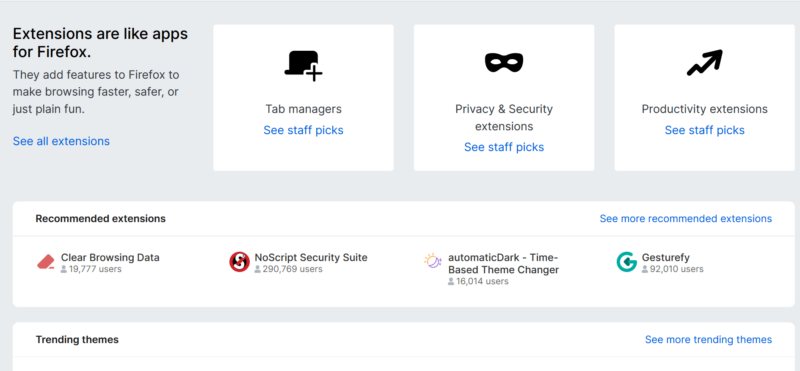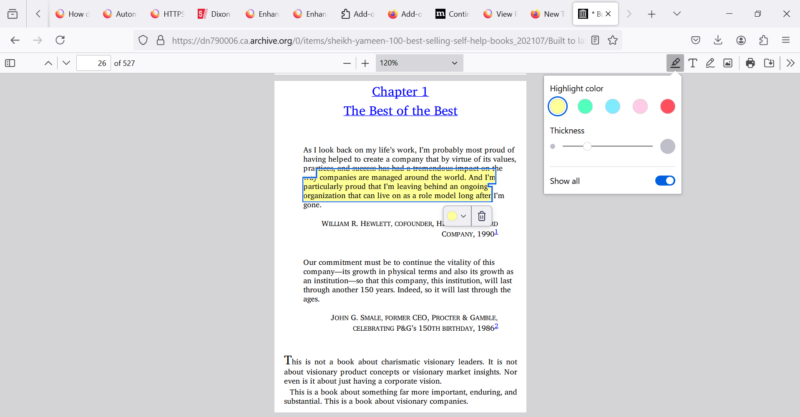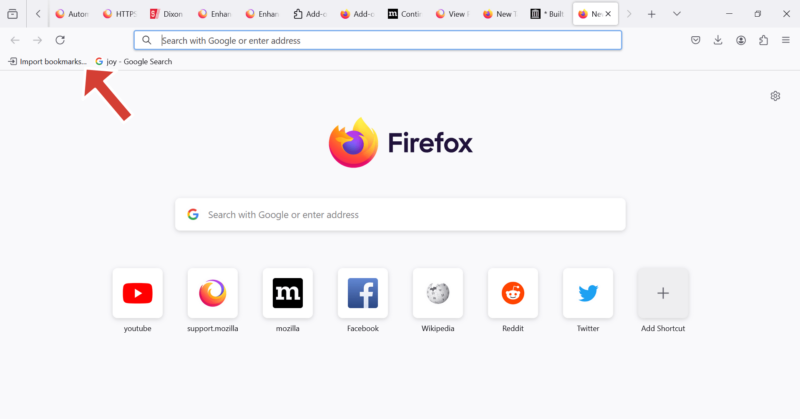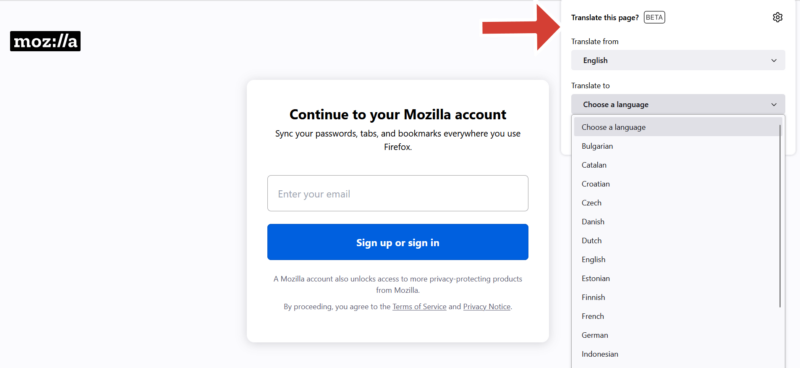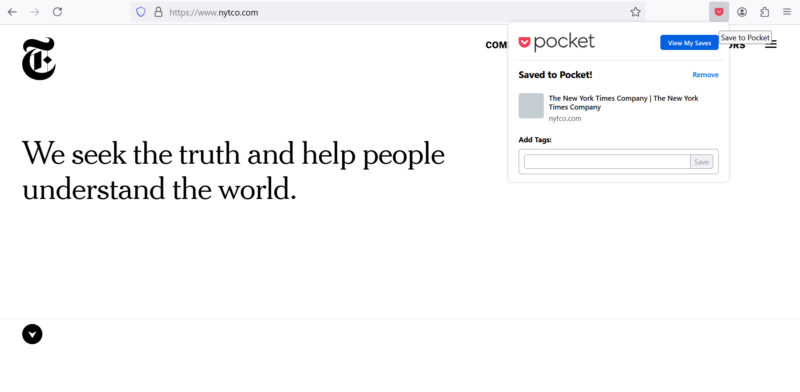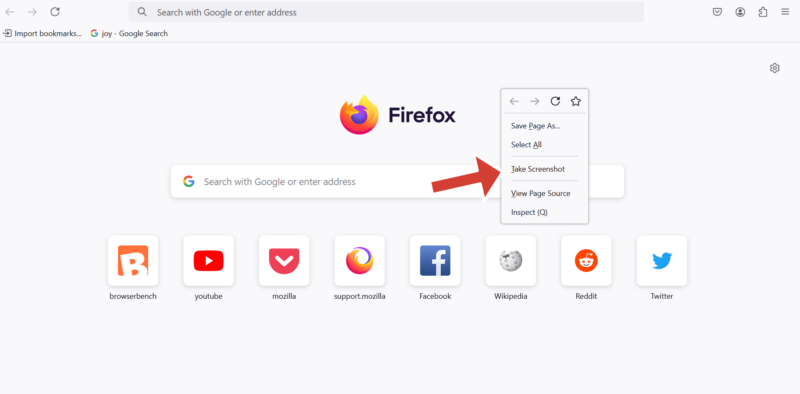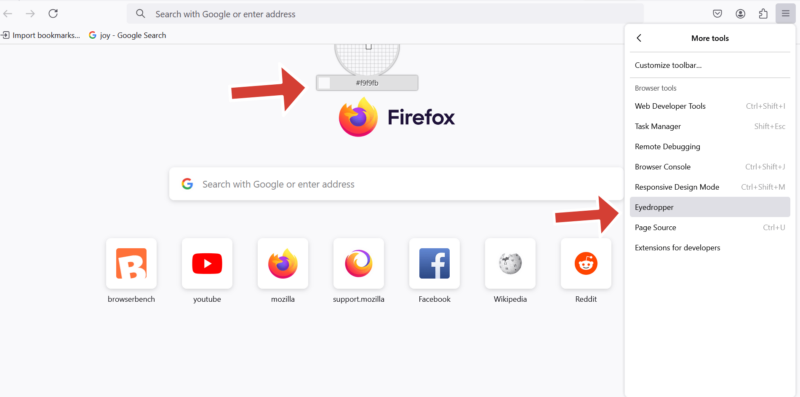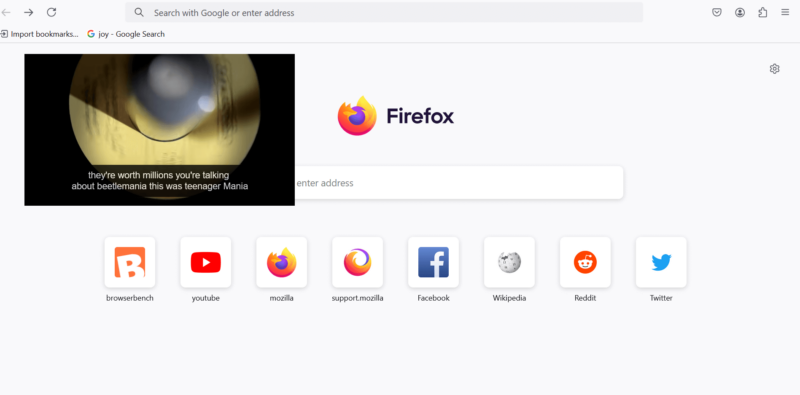Firefox Review
Firefox is one of the most popular web browsers in the world. We’ll explore whether it’s worth choosing Firefox over all its competitors by examining its features, performance, security and privacy. Read our Firefox review for the whole story.
Firefox has been around since 2004, and it has evolved into one of the world’s most popular browsers. However, with many browsers on the market, it might be difficult to decide whether Firefox should be your default browser. In this Firefox review, we’ll pick apart the browser’s features and performance to help you make the right choice.
Our first-hand testing focuses on five key areas: features, user-friendliness, performance, security and privacy. To give you a preview of our findings, Firefox is a secure and private browser, but it can’t always compete against the fastest browsers. Continue reading this review to learn all the details.
-
11/29/2021
Cloudwards conducted a fresh review of Firefox and expanded the review to cover more areas about the browser.
-
11/01/2024 Facts checked
Review rewritten to add more actionable sections and focus on user pain points.
Firefox Review: Overview
What Is Firefox?
Firefox is a free, open-source web browser created by the Mozilla Foundation, a non-profit organization. First released in 2004, Firefox averages more than 170 million monthly active users, making it a popular web browser across the globe. Firefox works on the major desktop and mobile operating systems: Windows, Mac, Linux, iOS and Android.
Firefox Review: Pros & Cons
Pros
- Easy to use
- Excellent privacy
- Strong security features
- Thousands of extensions
Cons
- May struggle to process complex or unfamiliar web apps
Features: What Can Firefox Do?
Firefox’s set of features includes tools for syncing your browsing activities, managing your tabs and bookmarks, and accessing and editing files.
Aside from using Firefox’s built-in toolbox, you can spruce up your browsing session with thousands of free extensions. Known as Firefox add-ons, these extensions function like apps and offer more functionality. Below, we highlight some of Firefox’s main features.
Firefox Browser Sync
A Mozilla Firefox account lets you sync your browsing history, saved passwords and bookmarks across your desktop and mobile devices. If you’re using Firefox on your computer but want to switch to your phone or tablet, the “Firefox browser sync” feature lets you pick up browsing right where you left off.
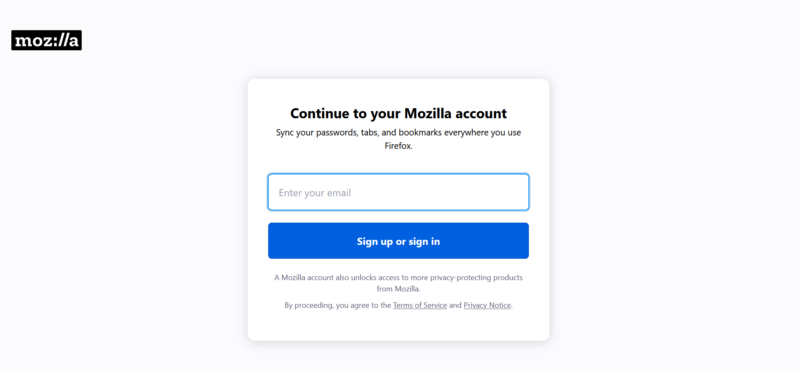
User-Friendliness & Hands-On Testing
Firefox is a user-friendly browser with apps for Windows, Mac, Linux, iOS and Android devices. It takes only a few minutes to download and install it, whether you’re on desktop or mobile. After the installation, Firefox offers a few prompts to help beginners set up the browser. This ease of use is a key reason why Firefox is one of the best browsers for Mac.
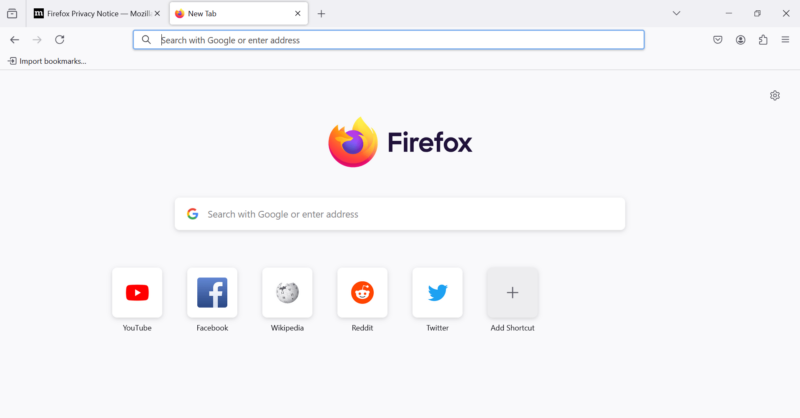
Firefox’s desktop version is clutter-free. A Google search bar is at the center of the page, with shortcut links placed below it. Other features include another search bar, buttons for your account and extensions, and a hamburger menu icon. When you start typing into the search bar, Firefox will suggest websites based on your history and trends.
If you’re not keen on Google Overviews when searching, check out our guide on how to turn off Google AI.
Firefox Tab Management
Firefox’s tabs let you access multiple websites in a single browser window. When you first open Firefox, a new tab will open automatically. You can open more tabs by clicking the “plus” sign to the right of the last tab. Links will open in the most recent tab by default, but you can also right-click a link and choose “open link in new tab.”
You can duplicate a tab, pin a tab, reopen a closed tab or bookmark a selected tab by right-clicking any tab and choosing the appropriate option. You can also switch between them by clicking on different tabs or by using the shortcut “Ctrl + Tab.”
To change the order of your tabs, simply drag a tab to the preferred position. It’s also possible to collect your tabs into tab groups. With this feature, you can make the browser display only one group of tabs at a time, which is perfect for reducing clutter.
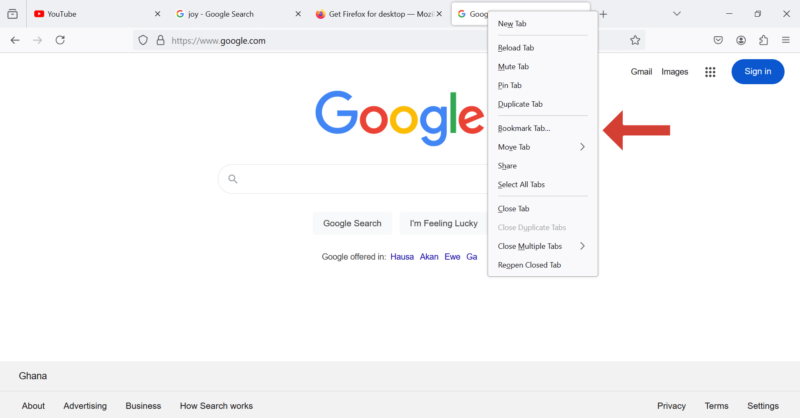
such as pinning and bookmarking.
You can move a tab into a new window by dragging it out of its current tab strip. For easy access, we recommend either pinning or bookmarking them. Pinned tabs automatically open when you start Firefox, whereas bookmarked tabs always appear in the bookmarks toolbar. If you want more control over your tabs, use a tab organizer add-on.
Firefox on Mobile
Like the desktop app, Firefox’s mobile app is free of clutter and well organized. It offers the same features and customization options as the desktop app. Firefox’s Android and iOS apps let users customize the homepage with shortcuts, bookmarks and wallpapers. These kinds of features highlight why Firefox made our list of the best browsers for Android.
The address bar and tabs button are at the bottom of the page, while the bookmarks section and the private browsing button (the sunglasses icon) are at the top. There’s also a three-dot menu (a “meatballs” menu) that offers access to various options, including bookmarks, history, downloads, passwords, extensions and settings.

Firefox allows you to switch to desktop mode, which lets users view web pages as they would appear on the desktop app. This is useful if the mobile version of a website lacks some features. You can also switch to a “dark mode” view to reduce battery drain and eye strain. All of these functions make Firefox one of the best browsers for mobile.
Firefox Performance & Speed
Based on our tests, Firefox is a moderately fast browser that is ideal for basic tasks like regular browsing and emailing. It’s also a good choice for heavy websites, though it might be a little slow while loading complex JavaScript applications.
We checked browser speeds using three benchmark tests provided by BrowserBench: Speedometer 2.0, JetStream 2 and MotionMark.
Benchmark Test: Speedometer
The speedometer test runs 480 standard JavaScript web applications and measures how many runs per minute your browser can handle. Firefox handled 11.4 runs per minute. This is a decent score, though some other browsers offer better performance — for example, Microsoft Edge averages 14.4 runs per minute.
Benchmark Test: JetStream 2
JetStream examines how many advanced JavaScript and uncommon web applications your browser can run per minute. In our test, Firefox averaged 127.47 runs per minute. This is a relatively low score, considering that Chrome posted 217.78. We tested Firefox’s ability by opening websites with complex JavaScript, and they sometimes loaded slowly.
Benchmark Test: MotionMark
MotionMark measures how quickly your browser renders advanced visual graphics. Firefox scored 880.08 runs per minute, which is an impressive score. By comparison, Chrome recorded 690.54 and Edge yielded 1079 runs per minute. In practice, we didn’t experience any unusual lags while loading heavy websites.
Firefox Security
Firefox offers many security features to help you browse safely. Built-in phishing and malware protection shields you from deceptive and malware-ridden websites. It will also alert you if a file you’re downloading contains malicious software or has the potential to make unwanted changes to your computer.
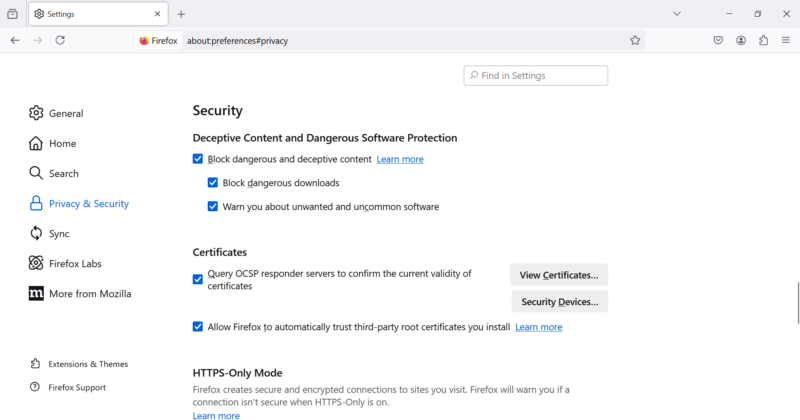
deceptive sites and unsafe downloads.
We recommend activating Firefox’s HTTPS-only mode if you’re using public WiFi. HTTPS websites use secure, encrypted connections. Enabling HTTPS-only mode forces all connections to use HTTPS, and it will alert you if a website connection isn’t secure. This feature is comparable to those offered by the most secure web browsers.
Another useful feature is Firefox’s password manager, which helps you create and store strong passwords. You can set the password manager to fill in usernames and passwords automatically. Firefox also checks for and installs updates by default, ensuring you always have the right security patches for safe browsing.
Pop-Up & Ad Blocking
Firefox has a pop-up blocker that is enabled by default. Each time Firefox blocks a pop-up, it displays an “options” button that opens a menu with more controls. Firefox also includes a pop-up allowlist so you can decide which websites can show pop-ups. The browser doesn’t block ads automatically, but you can use an ad blocker from the available extensions.
Firefox Privacy
If you want to browse privately, Firefox is an excellent option. Unlike Google, Mozilla is a not-for-profit organization that doesn’t rely on collecting users’ personal information to create targeted ads for money.
Mozilla makes money through web browser search partnerships and worldwide distribution deals. This is a stark contrast to browsers like Opera, which reserve the right to collect data on users. Our Opera vs Firefox article has that story.
Mozilla’s privacy policy says it collects technical and interaction telemetry data. Technical data includes your device’s operating system and crash reports, while interaction data covers items like the number of pages and tabs opened, and the extensions used. In the settings, you can stop Firefox from sending any of this data to Mozilla.
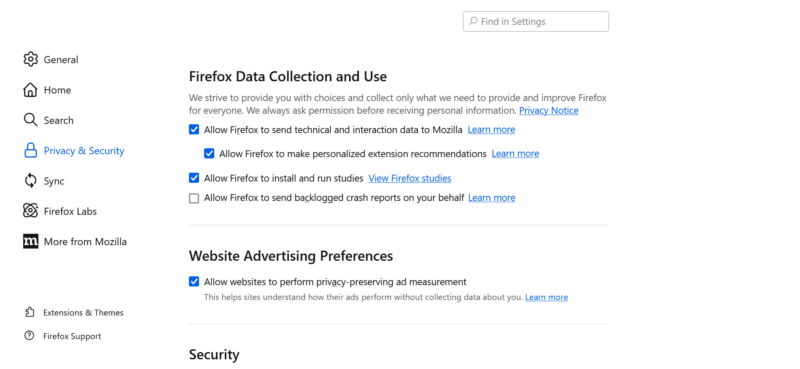
You don’t need an account to use Firefox, so you don’t have to share any personal information to use the browser. However, if you want to sync data across your devices, you’ll need to register for an account. The good news is that Firefox requires only your email address to create the account.
Unlike Google, Firefox hasn’t had many privacy scandals over the years. However, a privacy watchdog called NOYB recently filed a complaint accusing Firefox of using its privacy-preserving attribution (PPA) feature to track users. NOYB claims that this feature allows Mozilla to collect information about user activity.
NOYB has requested that the Austrian Data Protection Authority investigate Mozilla and compel the company to disclose its PPA data processing activities. Mozilla has argued against the complaint, saying that the PPA allows Firefox to anonymize the data sent by websites to advertisers.
Tracking Prevention
Trackers follow you around the internet to record data about your browsing habits and patterns. Firefox can block many trackers, especially malicious ones. Using a list of known trackers from Disconnect, Firefox blocks a wide range of trackers and scripts, including cross-site trackers, social media trackers, fingerprinters and crypto-miners.
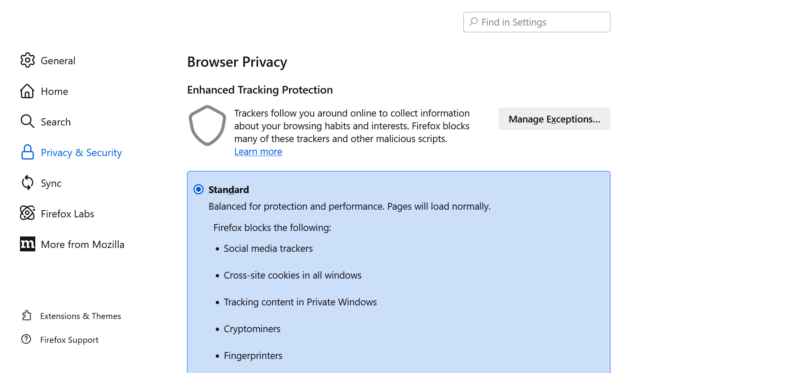
Firefox offers three tracker-blocking modes: standard, strict and custom. The standard mode protects against cookies, which are small files that browsers use to gather information on users. The strict mode is unforgiving, blocking cookies and anything else that seems like a tracker. This can cause some sites to break, though.
The custom mode allows you to choose which trackers and scripts to block. You can do this by selecting the categories of trackers you want to block, including cookies, crypto-miners and fingerprinters.
Private Browsing Mode
Firefox offers a private browsing mode similar to Chrome’s Incognito, which erases your browsing history and cookie data when you close the browser. It also stops cookie tracking by websites. In addition, when you browse privately, Firefox won’t know which files you download, though these files will still be present on your computer.
Firefox’s private mode is a good option if you don’t want to leave traces of your browsing history, but private browsing doesn’t make you completely anonymous. Your ISP, WiFi network administrator and some websites will still see your unguarded connection. A VPN like NordVPN is best suited to solve this problem.
The Verdict: Is Firefox Good?
Firefox is a good browser for users focused on security and privacy. It’s also a nice choice for beginners, thanks to its easy-to-use features and thousands of extensions. However, Firefox isn’t the best option for websites with heavy loads and complex JavaScript apps. Google Chrome offers better speeds and performance for those tasks.
Have you used the Firefox browser before? Did you have a seamless browsing experience, or did you suffer hiccups along the way? How do you think other browsers compare to Firefox? Share your thoughts and opinions with us in the comments section below. As always, thanks for reading.
FAQ: Mozilla Firefox Review
Yes, Firefox is a good browser, thanks to its rich feature set, user-friendliness, and excellent security and privacy features.
You can trust Firefox because it doesn’t collect or sell your personal information. You don’t even need an account to use Firefox. It also has important features like tracker blockers and a private browsing mode to protect your privacy.
Firefox doesn’t offer the best speed and performance when browsing sites with complex visuals and graphics.
Firefox is a more private and secure browser, but Google Chrome offers faster speeds and a larger extension library.

